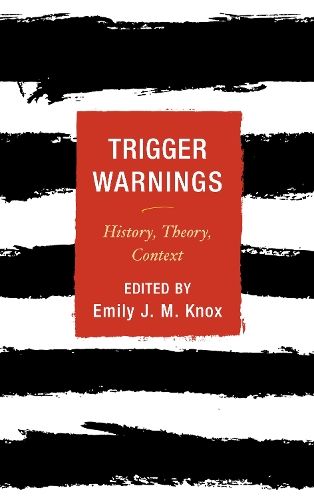
Trigger Warnings: History, Theory, Context
(Hardback)
Publishing Details
Trigger Warnings: History, Theory, Context
By (Author) Emily J. M. Knox
Bloomsbury Publishing PLC
Rowman & Littlefield Publishers
23rd May 2017
United States
Classifications
Professional and Scholarly
Non Fiction
Higher education, tertiary education
Educational strategies and policy
370.15
Physical Properties
Hardback
298
Width 159mm, Height 237mm, Spine 29mm
635g
Description
With triggered as Googles most searched word of 2016, trigger warnings have become a prevalent yet controversial concept in American higher education and society. As the debate over the value and place of triggering material continues, Trigger Warnings: History, Theory, Context provides the historical context and theoretical analysis of the use of trigger and content warnings in academia. This important edited collection examines the history, theories, and ethics of trigger warnings and presents case studies from instructors and students describing instances when trigger warnings were and were not used. By exploring the issue through several scholarly lenses and providing examples of when trigger warnings may or may not be used effectively, Trigger Warnings provides rigorous analysis of the controversy
Reviews
All the chapters are worth reading.... The book, as the editor hopes, is indeed fodder for discussion. * New England Archivists Newsletter *
Knox should be commended for compiling such a compelling collection of essays and case studies that really forces the reader to think critically about trigger warnings. * Journal of Intellectual Freedom and Privacy *
A timely and needed interdisciplinary compendium detailing the historical, legal, pedagogical, and practical context of trigger warnings. With arguments and case examples from a variety of vantage points, this edited collection provides a strong foundational basis to understand the promises and pitfalls of trigger warnings. -- Elana Newman, professor of psychology, University of Tulsa, and codirector, Tulsa Institute of Trauma, Adversity, and Injustice, University of Tulsa
Trigger Warnings is a nuanced look at the background and practice of the hot academic intellectual freedom topic of the day. The contributors don't always agree with each other, but they do provide a thoughtful introduction to the concerns, and the classroom reality, of a shift to a more student-centered and consciously inclusive educational style. Strongly recommended for all academic collections. -- James LaRue, director, American Library Association Office for Intellectual Freedom and the Freedom to Read Foundation
Author Bio
Emily J. M. Knox is assistant professor in the School of Information Sciences at the University of Illinois at UrbanaChampaign. Her research interests include information access, intellectual freedom and censorship, information ethics, information policy, and the intersection of print culture and reading practices. Knoxs book Book Banning in 21st-Century America (Rowman & Littlefield, 2015) is the first monograph in the Beta Phi Mu Scholars Series.
